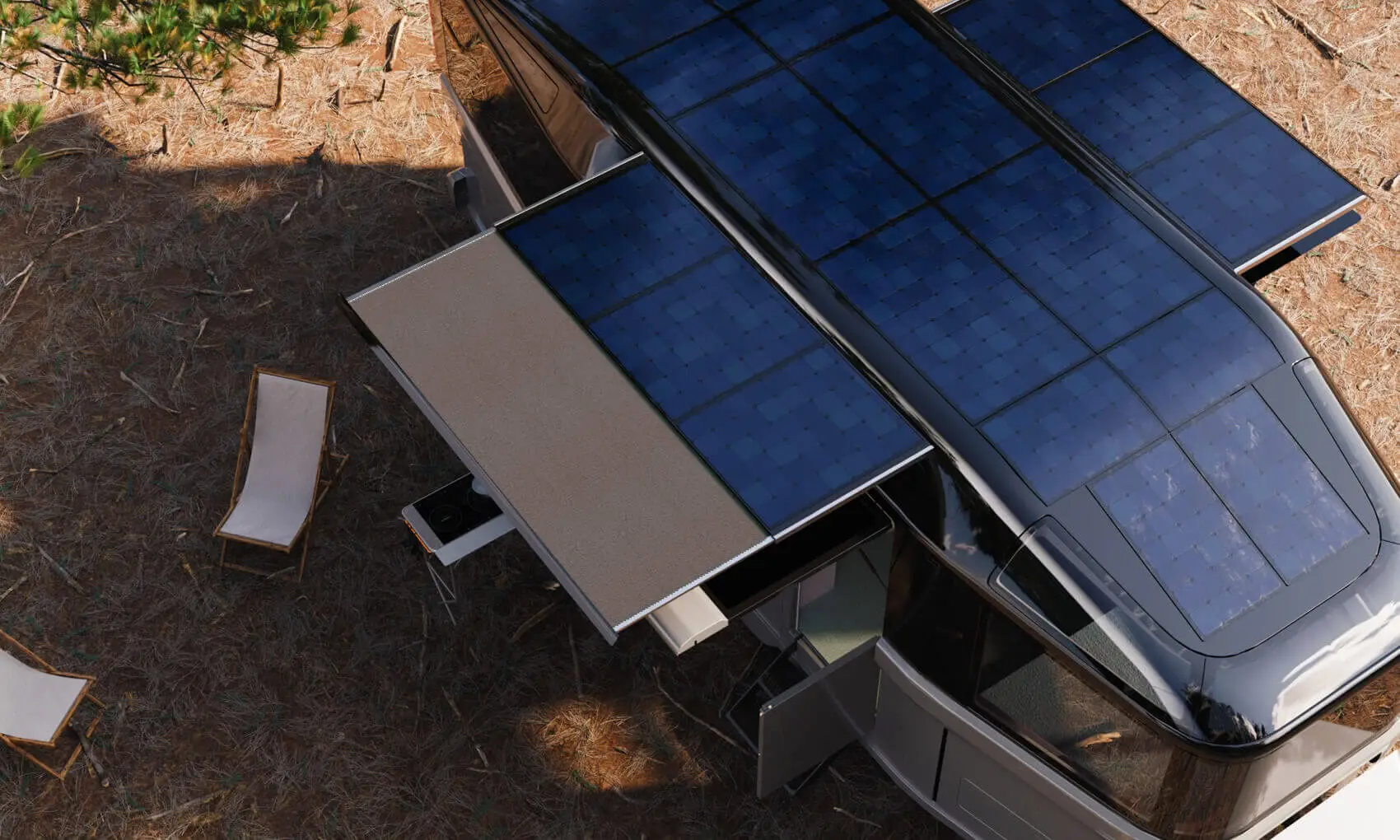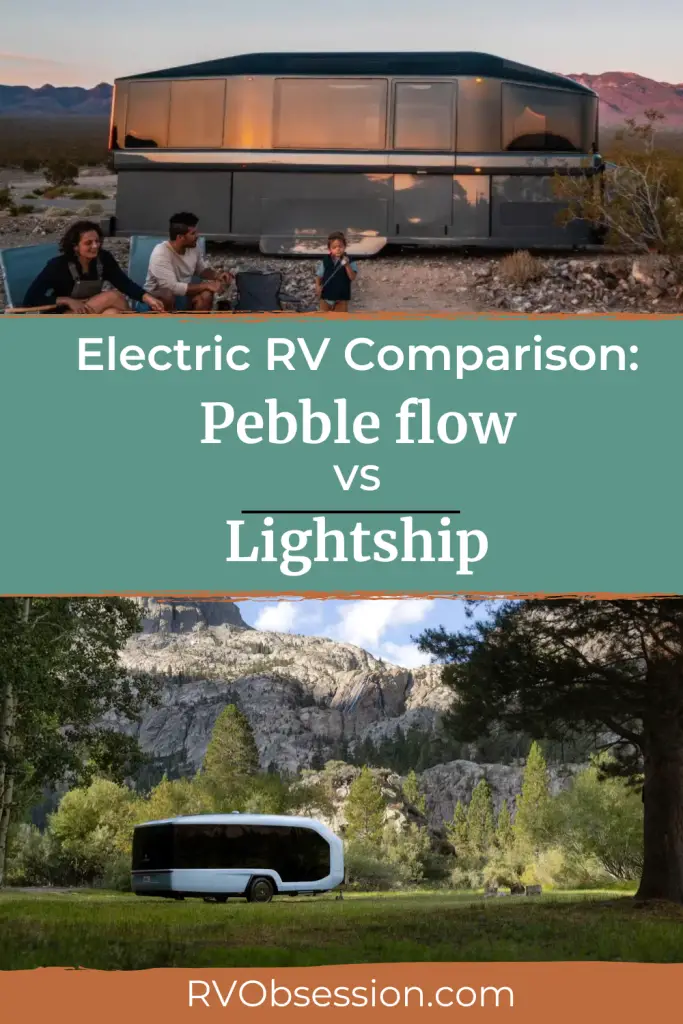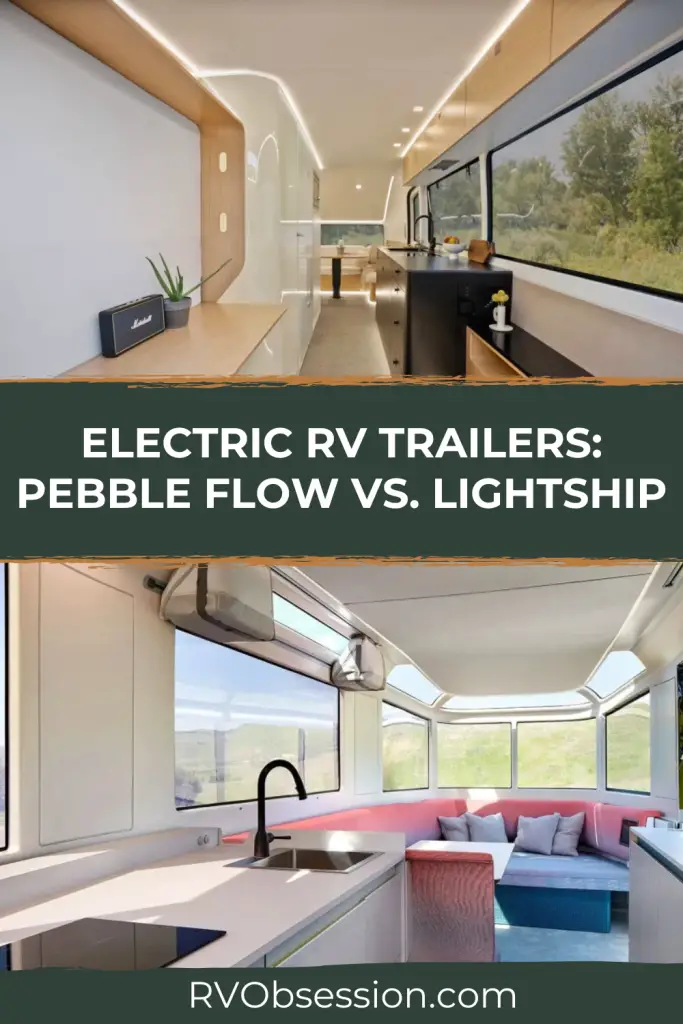Electric RV Trailer Comparison: Pebble Flow vs. Lightship L1
This post may contain affiliate links. See our privacy policy for details.
As electric vehicles gain popularity, the world of RVing is seeing its electric revolution. While we await an all electric RV or even a Tesla RV, electric RV trailers like the Pebble Flow and Lightship L1 are reshaping what it means to travel sustainably and efficiently. An electric travel trailer offers a compelling alternative to traditional gas-powered options for RVers who want to embrace eco-friendly travel without sacrificing comfort or technology.
Choosing the right RV trailer can make all the difference, especially for those who live on the road full-time or spend extended periods exploring off-grid. In this article, we’ll compare two of the leading electric RV trailers on the market, the Pebble Flow and the Lightship L1, to help you decide which model might best suit your lifestyle.
Let’s analyze each trailer’s pros and cons, considering considerations for couples, families, and eco-conscious travellers.
Electric RV Trailer Overview: Benefits and Differences
While electric RVs share some core features with traditional RVs, they stand out in several key ways, particularly regarding sustainability, energy efficiency, electric propulsion systems, regenerative braking, integrated solar panels, and cost over time. Here’s a closer look at what sets electric RVs apart and the advantages they offer.
1. Environmental Impact and Sustainability
- Unlike standard RV trailers that rely on gasoline or diesel generators, electric RV trailers run on rechargeable batteries, reducing emissions and helping to reduce air pollution. This makes features such as a 240V AC Output or an induction cooktop possible. If you are passionate about eco-friendly travel, this is a major advantage.
- Many electric RV trailers also incorporate solar panels, making them more self-sufficient and ideal for off-grid travel. Solar panels can power basic amenities without needing to recharge at a station, which is both convenient and environmentally responsible.
2. Lower Long-Term Costs
- Fuel costs are significantly reduced without gas or diesel, especially if you are a frequent traveler. A battery-powered RV trailer gets you off-grid for longer.
- While cheaper initially, standard RVs incur ongoing fuel expenses and regular maintenance costs, especially for engine-related issues. Over time, reduced fuel and maintenance savings can offset the initial investment in an electric RV trailer.
4. Limitations and Charging Infrastructure
- A primary drawback for electric RV trailers remains the availability of charging stations, which can be limited in remote areas. While major highways and urban regions are increasingly equipped with charging points, rural destinations may not have the infrastructure to support electric vehicles yet. If you are a long-haul traveler or venturing off the beaten path, this can be a concern.
5. Energy Independence and Off-Grid Potential
- With advances in battery technology and solar integration, electric RVs are becoming increasingly appealing for off-grid living. Solar-powered systems, like those available on the Lightship L1, offer a degree of independence and emergency energy backup advantages not found in standard RVs. This allows you to stay off-grid longer, relying on the sun for power rather than fuel.
Electric RVs represent a bold shift toward more sustainable travel. While some limitations still exist, particularly around charging infrastructure, they offer a range of benefits that make them an exciting option whether you are eco-conscious or a tech enthusiast.
Comparing Pebble Flow & Lightship L1 Features
Pebble Flow
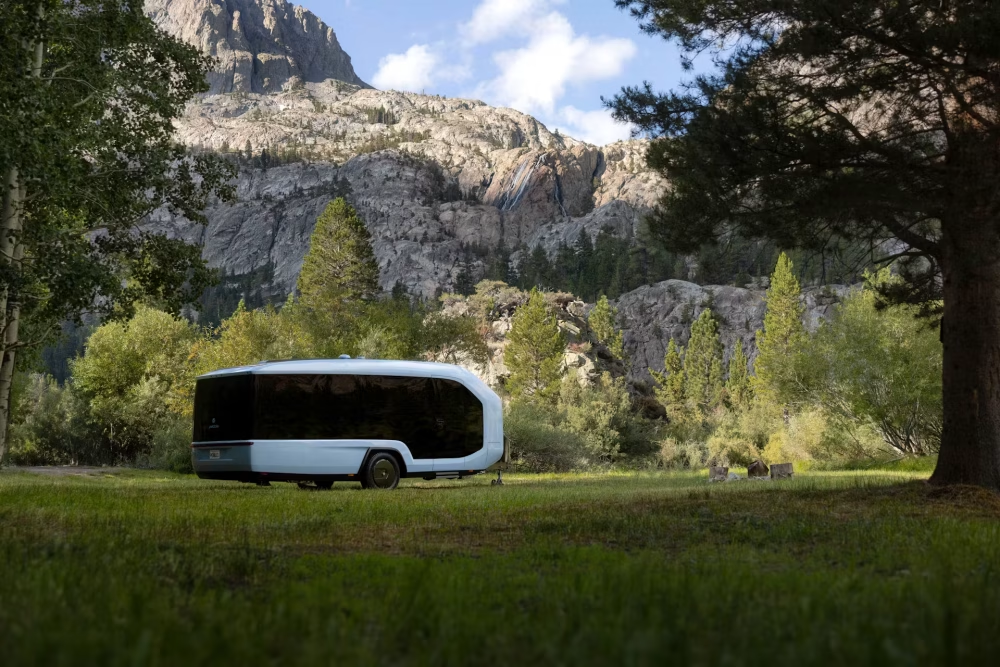
Pros:
- Aerodynamic Design: The Pebble Flow boasts a sleek, aerodynamic shape, making it three times more aerodynamic than conventional travel trailers. This design enhances fuel efficiency and provides a safer towing experience.
- Automotive-Grade Construction: Built with an all-aluminium space frame and lightweight composite materials, the Pebble Flow ensures durability and longevity, surpassing industry standards.
- Integrated Solar Power & Battery: Equipped with a 1 kW integrated solar system and 45kWh LFP battery, it allows for self-charging on the go or when parked, and up to 7 days off-grid. This state-of-the-art solar-powered RV trailer maintains a consistent power supply akin to being perpetually plugged into a 110V outlet. For reference, 45kWh is equivalent to 3.5x the power of a Tesla Powerwall.
- Spacious Interior: The pebble flow interior features panoramic windows offering a 270° view, convertible furniture, and a minimalist, modern interior design, providing a comfortable and flexible living space.
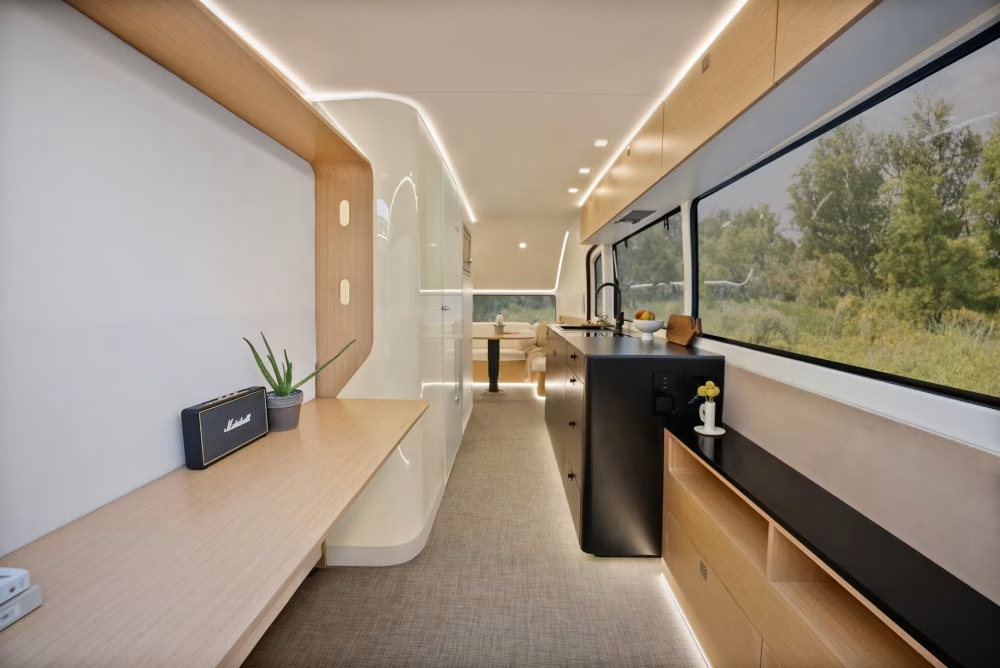
- Advanced Technology: Includes a Magic Hitch for self-aligning and hitching, remote control capabilities via the Pebble App, and an InstaCamp feature that automates camp setup and retraction.
Cons:
- Limited Availability: As a newer entrant in the market, the Pebble Flow may have limited availability and a smaller service network, potentially affecting maintenance and support.
- Price Point: Advanced features and high-quality materials may result in a higher initial purchase price than traditional RVs or trailers.
Lightship L1
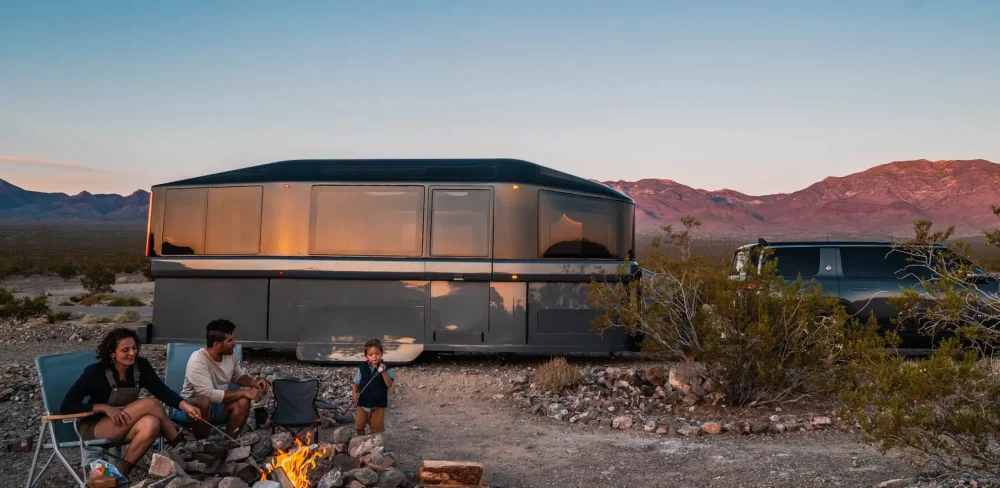
Pros:
- Electric Propulsion System: The Lightship L1 features an electric powertrain with up to 80 kWh of onboard battery capacity. This allows the trailer to propel itself and achieve near zero range loss for the tow vehicle.
- Extensive Off-Grid Capability: With up to 3 kW of solar power and a robust battery system, the L1 can provide a week of off-grid power without charging, eliminating reliance on propane and other fossil fuels as an emergency energy backup.
- Aerodynamic Efficiency: Designed to be three times more aerodynamic than traditional travel trailers, reducing drag and enhancing towing efficiency.
- Spacious and Modern Interior: Offers a comfortable living space with modern amenities, suitable for families and extended travel. Have a look at the Lightship L1 camper interior here.
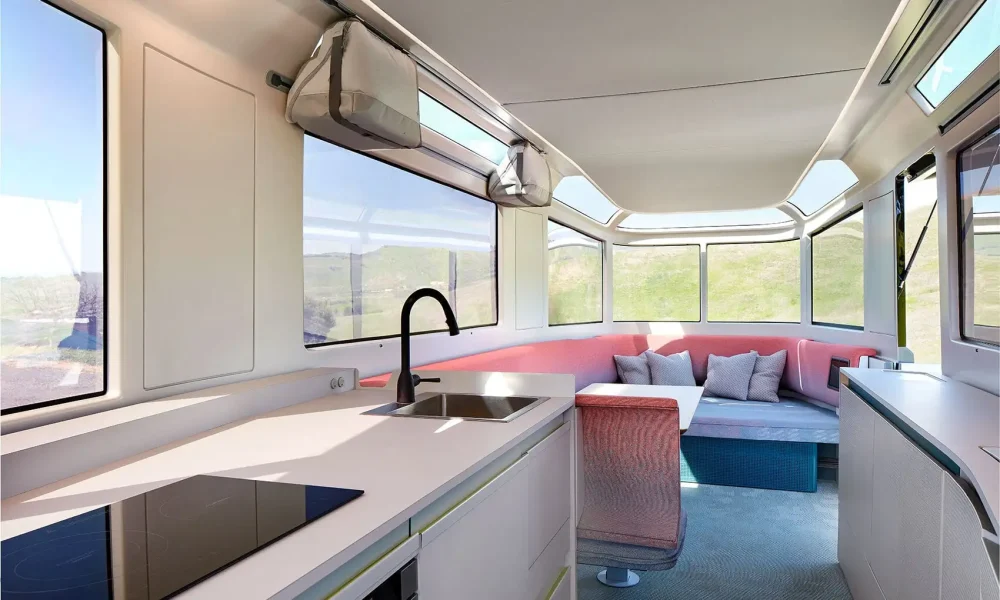
Cons:
- Higher Cost: The advanced technology and features contribute to a higher price point, which may be a consideration for budget-conscious buyers.
- Weight Considerations: The self-propulsion system and large battery capacity add weight, which may require a more robust tow vehicle.
- Charging Infrastructure: While capable of off-grid power, recharging the battery system may be challenging in areas with limited charging infrastructure.
The Pebble Flow and Lightship L1 both offer innovative features in terms of aerodynamics, solar power, and environmentally friendly off-grid power. The L1, with its electric powertrain and 3kW battery, has advantages if you intend to spend a lot of time off-grid. However, if you frequently move to locations with more power access, the Magic Hitch and InstaCamp features can be a godsend.
A Real-Life Suitability Case: Couples vs. Families
[Insert Image Here]
As outlined above, the Pebble Flow and Lightship L1 offer unique benefits and lots of smart RV technology, but the true test is which is better suited for particular lifestyles. Here, we’ll compare the pros and cons of each for couples and families.
For Couples
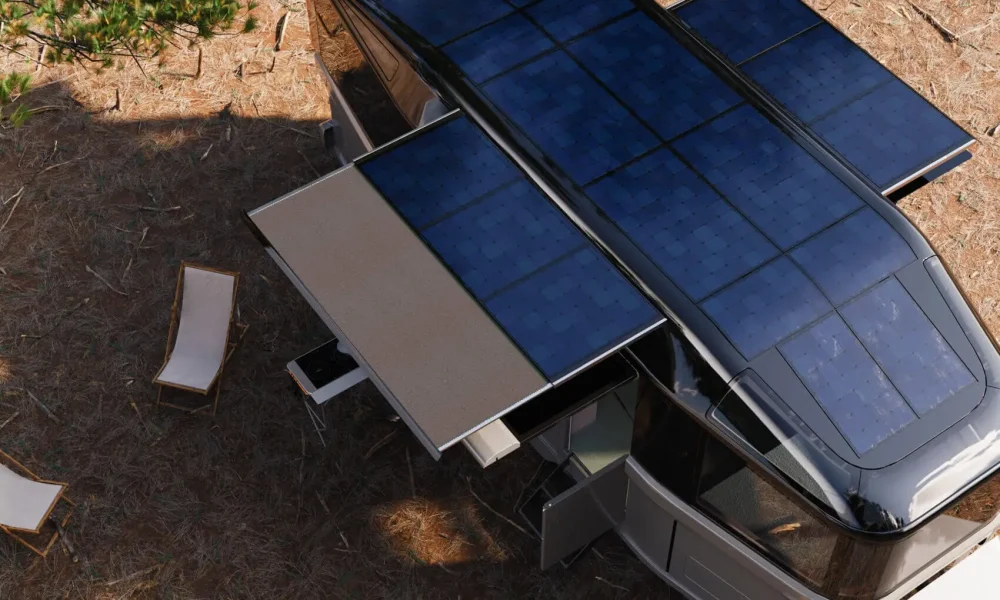
Full-time RVing for couples is often about maximizing comfort, enjoying flexibility, and maintaining a minimalist lifestyle. Here’s how each trailer measures up:
Pebble Flow
- Compact and Stylish: The Pebble electric RV has a sleek, compact design making it perfect for couples prioritizing easy towing and a more intimate space.
- Tech Integration: The advanced features, like the self-aligning hitch and Pebble App, make setup and control a breeze, allowing couples to spend more time exploring and less time managing their setup.
- Pros for Couples: It is lightweight and easy to navigate, low maintenance, and ideal for those who value technology and simplicity over extensive living space.
Lightship L1
- Spacious Interior: With a roomier design, the Lightship trailer offers more comfort for couples stretching out or working remotely on the road. The layout is spacious enough to set up workspaces or personal zones within the trailer.
- Solar Power: 3kW might not stretch very far with a larger group of people, but for couples who can manage their energy usage, it can be enough to maintain a comfortable life for an extended period of time.
- Pros for Couples: Roomy and efficient, it’s a great choice for those looking for extra space without sacrificing off-grid capability and a sustainable, high-tech design.
For Families with Children
Full-time RVing with children brings new requirements—extra sleeping arrangements, additional storage, and safety are all priorities. Here’s how the Pebble Flow and Lightship L1 compare for family use:
Pebble Flow
- Compact Space for Small Families: The Pebble Flow can work for small families who don’t need an expansive interior. While it may be cozy, the minimalist design allows for easy cleaning and organization, and its advanced tech features simplify camp setup, allowing parents to focus on family time.
- Limitations for Larger Families: For families with more than one child, the Pebble Flow might feel cramped, as it has limited floor space and fewer built-in storage options than the Lightship L1.
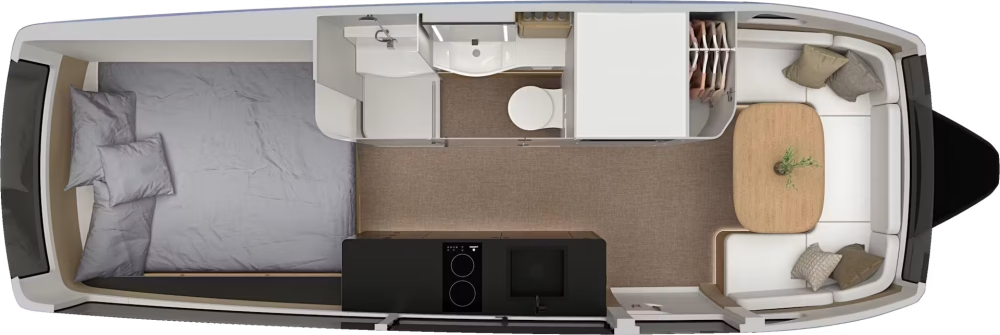
- Pros for Families: It’s great for a couple with one child or a smaller family. It’s cost-effective and easy to maintain, but the limited space may require some creative solutions for storage and sleeping.
Lightship L1
- Spacious and Flexible Interior: The Lightship L1’s roomier layout is more accommodating for families. A larger living area provides plenty of space for additional bedding, storage, and activities, making it ideal for family life on the road.
- Off-Grid Living with Children in Mind: The Lightship’s robust solar and battery setup allows campers to camp in remote areas without needing to plug in, an advantage for families who want the freedom to explore widely without worrying too much about power. This is especially beneficial for families looking to keep children entertained off-grid with devices or lighting for reading.
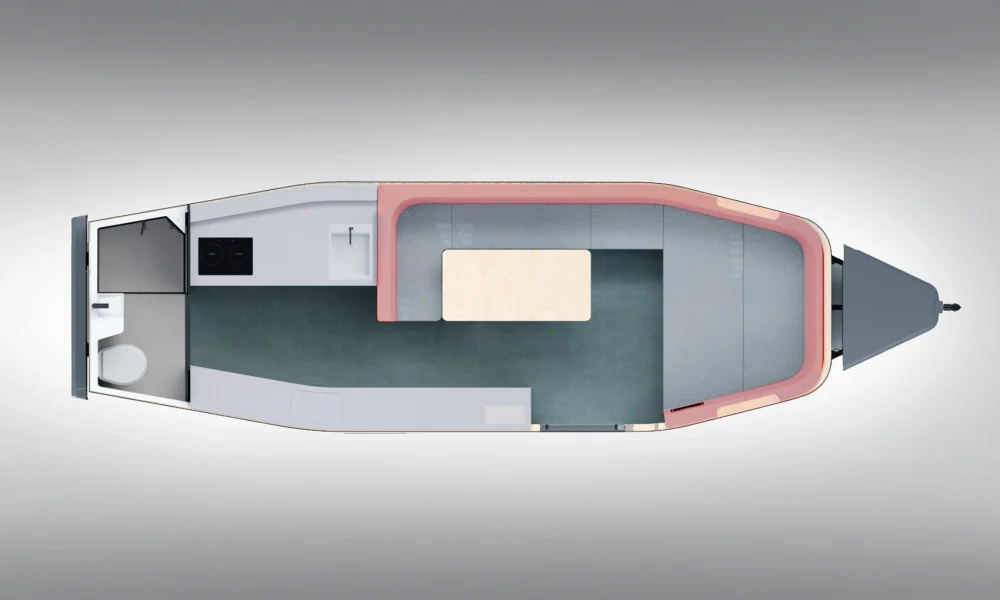
- Pros for Families: It’s more spacious and equipped for off-grid living, making it suitable for larger families or those with older children who need personal space.
The Pebble Flow may be ideal for full-time RV living for smaller families or couples who prioritize minimalism and ease of use. At the same time, the Lightship L1 caters more to families needing extra space and off-grid capability. Both offer unique solutions, but the choice largely depends on space needs, lifestyle preferences, and energy requirements.
Conclusion
The Pebble Flow and Lightship L1 both represent the exciting future of electric RVs, bringing unique features to meet the needs of diverse travelers. For couples or small families living full-time in an RV, the Pebble Flow offers a sleek, compact, and technology-driven option that’s easy to tow and perfect for those who prioritize simplicity and smart features.
The Lightship L1 stands out with its spacious layout, self-propulsion capabilities, and extensive off-grid power. It is ideal for families seeking extra room and sustainability for long-term or remote travel. The Pebble Flow is well-suited for those who prioritize ease of setup and lower costs, while the Lightship L1 appeals to those looking for a high-tech, energy-independent experience.
When compared to traditional RVs, these new options offer significant advantages in terms of energy efficiency, environmental impact, and long-term cost savings, despite the current limitations in charging infrastructure.
Ultimately, choosing between the Pebble Flow and Lightship L1 comes down to assessing your personal travel style, space requirements, and interest in advanced technology. With either model, RVers can enjoy the freedom of the open road in a sustainable, comfortable way, and tailored to the demands of modern adventure.
We hope this comparison helps you decide which electric RV is best for you. We’d love to hear your thoughts in the comments below!

